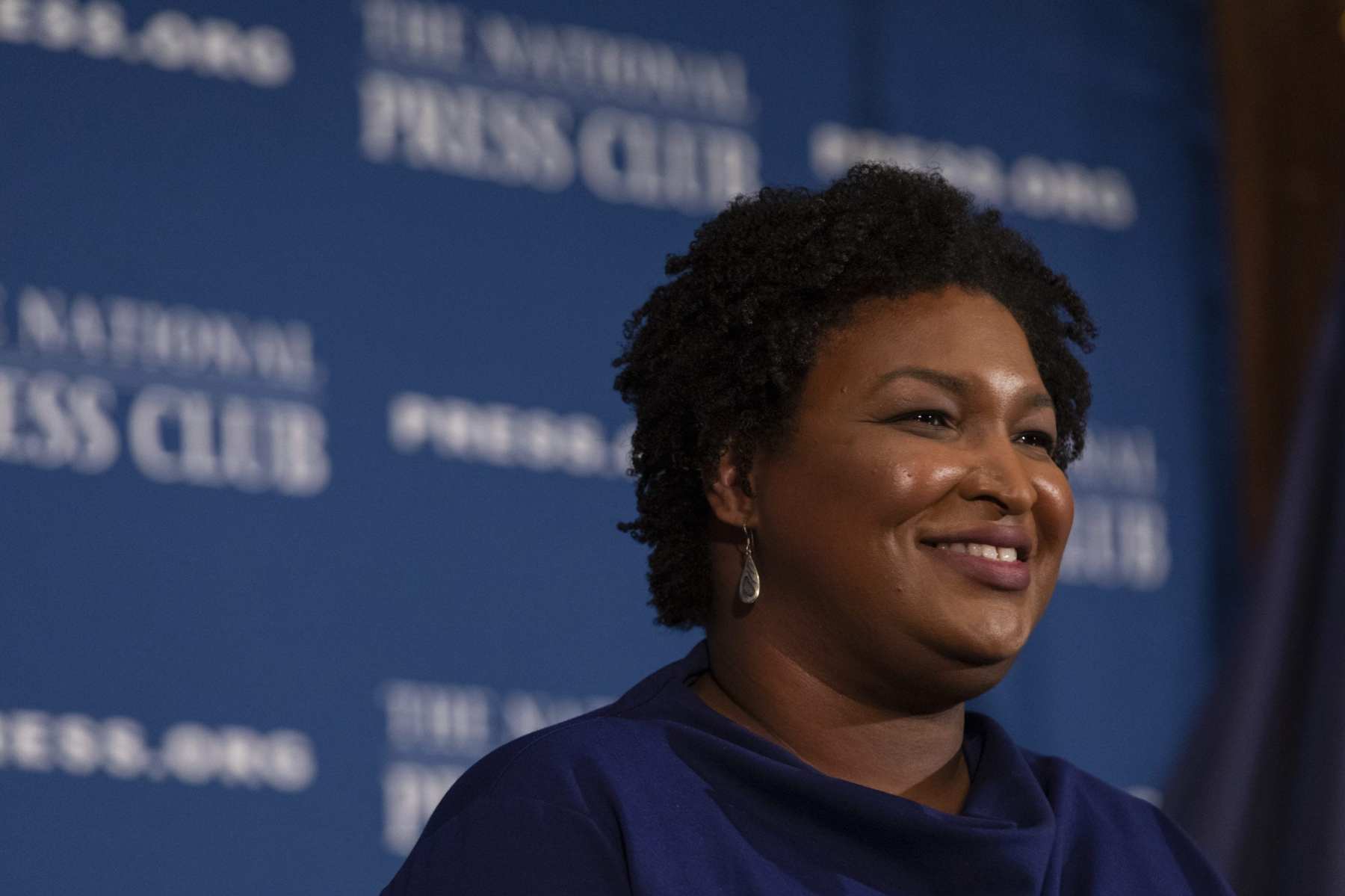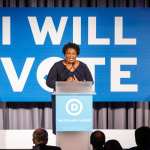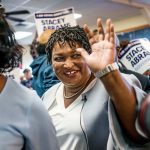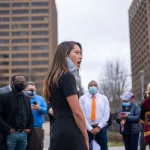This story was co-published with The Washington Post.
Sitting behind the pulpit in Brown Chapel in Selma on Bloody Sunday, Stacey Abrams was visibly moved as the choir filled the hallowed sanctuary with an old hymn:
Order my steps in your word, dear Lord
Lead me, guide me, every day
It was a rare display of emotion for the daughter of United Methodist preachers, Abrams’s normally placid demeanor stirred by the swelling voices.
The moment came the day after the South Carolina primary and two days before Super Tuesday — a 72-hour stretch that would put the power of the Black vote at the center of the 2020 election for the first time this cycle — as presidential candidates gathered with civil rights leaders and foot soldiers to mark the 55th anniversary of the battle that so horrified Americans that it led to the passage of the Voting Rights Act of 1965.
Abrams, the most visible and vocal African American woman pushing back against efforts to block ballot access, was the keynote speaker. Her narrow loss in her 2018 bid to become the first Black female governor in the country two years ago is asterisked by allegations of voter suppression by her opponent, then-Secretary of State Brian Kemp. In the months since, Abrams has returned to her roots as a voting rights advocate.
At 46, Abrams has a political career steeped in an abiding understanding of the historical disenfranchisement of Black voters, the stinging feeling that voter suppression thwarted her own ambitions and now, a new menace to the franchise: a pandemic that will change the way millions of Americans participate in the next election.
It is a moment at once familiar and unprecedented for Abrams, whose leadership in an uncertain time is being tested as she is being considered — and openly campaigning for — the second-most-powerful job in America, again seeking a role never before held by a Black woman.
Greeted in Brown Chapel by an ovation that rivaled those for the presidential candidates who spoke before her, Abrams thanked those who put their bodies on the line on the Edmund Pettus Bridge before urging those in the audience, her parents looking on in the pews, to join her in the fight ahead.
“We get the power we’re willing to work for,” she said, her voice rising. “We will have what we need, so let’s get it done.”
A month later, Abrams was making the case for voter turnout on a conference call, now the primary means of communication for many Americans in the midst of the coronavirus pandemic.
More than 1 million Americans have been infected, tens of thousands have died, and the economic fallout has forced more than 30 million people to file for unemployment. Black Americans are disproportionately exposed to and dying from the virus, accounting for 30 percent of deaths despite being only 13 percent of the U.S. population. Black unemployment is also outpacing that of White Americans.
On the April 8 conference call — the day after a Wisconsin primary that raised concerns about in-person and mail-in balloting during a pandemic — Abrams was speaking not as a candidate or voting rights activist, but about the virus’s threat to her state, particularly in the southwest Georgia town of Albany, emerging as an international hot spot.
“What we saw happen in Wisconsin yesterday, what we have seen happen in southwest Georgia over the last few months and what we know is likely to occur in November should give all of us pause, but it should also not make us despondent,” Abrams said. “Right now, I see the work that needs to be done is to be in service to communities that are facing a terrifying reality.”
She tied the pandemic to political participation in the state’s upcoming primary, which has been postponed until June 9. State officials have sent absentee ballot applications to registered voters, but ballots don’t include postage — a move Abrams has criticized as an insincere attempt to encourage voting by mail.
“The money for serving these communities, for allocating the number of beds, for protecting our public health workers, the money for the next pandemic is going to be decided by the census count for 2020,” Abrams said. “Our ability to direct our leaders to do better is determined by our participation and our right to vote.”
She called voting by absentee ballot “the first step to reclaiming our democracy” and said the message from Wisconsin’s Republican leadership was that “retaining power was more important than protecting people’s lives.”
“That cannot be the message that comes out of Georgia,” Abrams urged. “We have to have proof that this works for November.”
Abrams’s awareness of the fragility of the franchise has shaped her work for nearly four decades.
In February, before the virus would ravage the country and Biden cleared the field of his rivals, Abrams was in southwest Georgia, speaking at the Brooks County NAACP’s annual dinner in the small town of Quitman, where 3 out of 4 residents are Black. The town became a voter suppression battleground in 2010, when Kemp sued on allegations of voter fraud a dozen residents whose absentee ballot campaign integrated the county’s school board for the first time. The Quitman 10+2, as they became known, were acquitted on all charges after a lengthy legal battle.
A decade later, Abrams shared a story with the crowd. The September before the 2018 Georgia gubernatorial race, she visited her grandmother Wilter Abrams in Mississippi. Sitting on the edge of the bed in her grandmother’s room, Abrams confessed that despite turning in thousands of absentee ballots — more than any Democratic candidate in the history of Georgia — and having good poll numbers, one of the nation’s best statewide election protection operations and an army of volunteers, she was tired and she was worried about the election’s process and outcome.
Wilter Abrams gripped her granddaughter’s hand with her own, her thin, papery skin and delicate bones squeezing tightly as she offered a rare glimpse into her life under legal segregation: “I remember the first time I voted.”
The year was 1968, three years after the passage of the Voting Rights Act of 1965, but the first opportunity for Abrams’s grandmother to cast a ballot in a presidential election. On Election Day, it was Wilter Abrams who sat on the edge of the bed, terrified of what might happen when she finally reached the polls her friends, neighbors and family had fought hard to access.
After some reassurance, the couple went down to the precinct, dressed in their Sunday best, and cast their ballots for the first time without incident. Her grandmother never missed an election after that.
“What she was telling me,” Abrams reflected, “was that she was afraid of power, because ultimately, that’s what the right to vote was. And in the moment where it was most possible, she was afraid to take it, afraid maybe it was a trick — or, more importantly, afraid maybe it was real.”
As a freshman at Spelman College, Abrams registered to vote when she was 18. Save a special election here or there, she said she hasn’t missed a vote.
In the years since, Abrams has served as deputy city attorney in Atlanta and was Democratic leader of the Georgia House of Representatives from 2011 to 2017. In 2014, Abrams started the New Georgia Project, adding roughly 69,000 voters to the rolls.
Abrams commands a deep understanding of the history of the franchise. She harks back to the Voting Rights Act and its initial purpose.
“The Voting Rights Act, what it did for us between 1965 and 2013, was to create the oversight that says, ‘Yes, we’re going to trust, but we’re going to verify. We’re going to make you do the right thing,’” she said.
But she blames the Supreme Court, which overturned part of the VRA in 2013, for failing to understand that “long lines [at the polls] did not exist because of enthusiasm; they existed because of underinvestment in Black and Brown polling places. They existed because of failed administrative responsibilities by a number of states that while being held to a higher standard, the standard wasn’t high enough.”
“She built an organization that is spread across the United States to fight the metastasized cancer of voter suppression,” said Carol Anderson, a political scientist at Emory University and an expert on voting rights and voter suppression. “She’s got that unique ability to have the imagination and operational skills to make things happen. You want Stacey Abrams in this fight for democracy.”
Abrams describes voting as “an expression of the policies we want to see.”
“I’m in politics because I believe in politics,” she said. “When I did not become governor, I gave myself the obligation to think about what work could I do even if I didn’t have the title? And the work that drove me to run for governor remained.”
Right now that work focuses on the three organizations Abrams created after her 2018 defeat. Fair Fight has more than 40 staffers targeting voter suppression in nearly 20 states. Fair Count focuses on ensuring an accurate tally of the U.S. census. And the Southern Economic Advancement Project is aimed at addressing racial inequities in the region around issues including the economy, health care, transportation, children and the environment.
Last month, Abrams also joined a coalition including former 2020 Democratic contender Andrew Yang, Julia Louis-Dreyfus and Stephen Colbert for the Project 100 initiative, which aims to send $1,000 to 100,000 families hit hardest by covid-19. The effort has already raised $55 million and helped nearly 5,000 families across 21 states.
With Georgia’s primary less than a month away, the urgency to figure out a protocol for safe and fair voting is rising.
“When I created Fair Fight, we believed there would be some catastrophe that would assail our elections,” Abrams told CNN last week. “I never imagined it would be a pandemic, but we understood that we had to fight to protect the infrastructure of our democracy and start to fix what has been broken by voter suppression. Our responsibility is to make it as safe as possible, and the safest path is to ensure that early voting happens by mail.”
Abrams is also pushing for $3.6 billion in upcoming coronavirus recovery legislation in Congress for states to scale up their vote-by-mail initiatives and to be able to conduct safe in-person early and same-day voting.
During all of this, Biden has pledged to select a woman as his running mate, but it is unclear whether he will, as some have called for, choose a Black woman — a choice that, to some, represents a reward for the Democratic Party’s most loyal constituency. Abrams, who declined to endorse Biden during the crowded primary contest, said she now supports him and is “excited” that he is the presumptive nominee.
She’s also now routinely mentioned as a potential vice presidential running mate for Biden. When asked about this, Abrams makes the case for why she should be on the 2020 Democratic presidential ticket, getting straight to the point after ticking off her résumé of management experience, executive experience, foreign policy experience and legislative experience.
It’s a pitch that upends the presidential politics playbook. But again, for Abrams, there is no playbook.
“You can’t change things that you don’t talk about,” she said. “And you can’t combat myths that you don’t confront. And so, part of my responsibility is to articulate in clear and unequivocal language what I am capable of — and thus, what other women of color, other Black women are capable of.”







